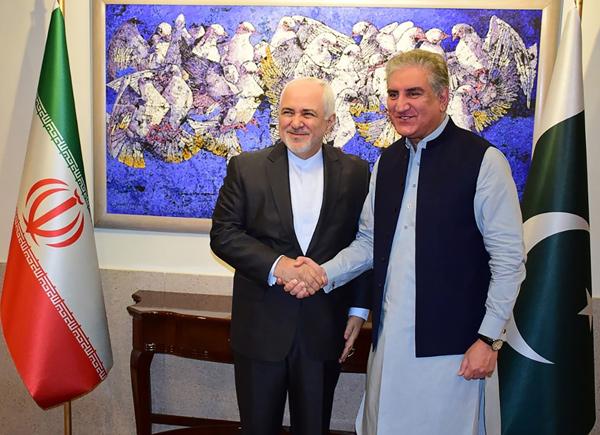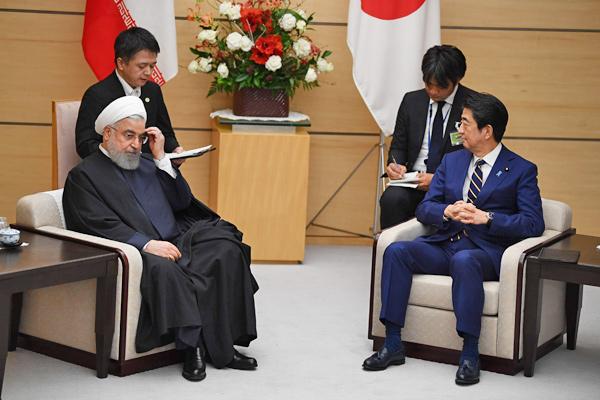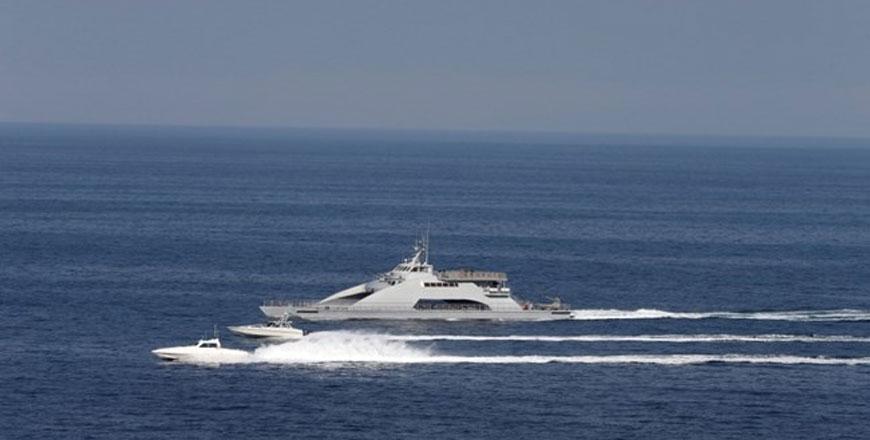You are here
Iran says US troop boost ‘threat to international peace’
By AFP - May 26,2019 - Last updated at May 26,2019

In this handout photo released by Pakistan's ministry of foreign affairs on Friday, Pakistan's Foreign Minister Shah Mehmood Qureshi (right) shakes hands with his Iranian counterpart Mohammad Javad Zarif at the foreign ministry in Islamabad (AFP photo)
TEHRAN — Iranian Foreign Minister Mohammad Javad Zarif said on Saturday a US decision to deploy 1,500 additional troops to the Middle East is a "threat to international peace", state media reported.
"Increased US presence in our region is very dangerous and a threat to international peace and security and must be confronted," Zarif told the official IRNA news agency before heading home from a visit to Pakistan.
Washington says the reinforcements, which come after the deployment earlier this month of an aircraft carrier task force, B-52 bombers, an amphibious assault ship and a missile defence system, are in response to a "campaign" of recent attacks approved by Iran's top leadership.
Those include a rocket launched into the Green Zone in Baghdad, explosive devices that damaged four tankers near the entrance to the Gulf, and a drone attack by Yemeni rebels on a key Saudi oil pipeline.
Iran has denied involvement in any of the attacks.
"Americans make such claims to justify their hostile policies and to create tension in the Persian Gulf," Zarif said.
The United States this month ended the last exemptions it had granted from sweeping unilateral sanctions it reimposed after abandoning a landmark 2015 nuclear between major powers and Iran in May last year.
The move dealt a heavy new blow to Iran's already reeling economy as even vocal critics of the renewed sanctions, like Turkey, announced they had stopped buying Iranian oil.
Iran has appealed repeatedly to the other parties to the 2015 nuclear deal — Britain, China, France, Germany and Russia — to rescue it from renewed US sanctions, so far to little avail.
Britain, France and Germany launched a special payment system called INSTEX — the Instrument in Support of Trade Exchanges — in late January to enable Iran to keep trading with European companies.
But in March Iran's Supreme Leader Ayatollah Ali Khamenei dismissed the mechanism as a "bitter joke".
Brinkmanship fears
Earlier this month, on the first anniversary of Washington's withdrawal from the agreement, Tehran announced it was rolling back some of the limits on its nuclear activities it had agreed under the deal.
It threatened to suspend more if there was no action from the major powers within 60 days on honouring their own commitments to sanctions relief.
The European powers denounced Iran's threat to resume nuclear work, but urged the US not to further escalate tensions with a military build-up.
The successive US deployments have raised concerns, even among governments close to Washington, that brinkmanship with Tehran could lead to a dangerous miscalculation.
The Gulf sultanate of Oman, which has acted as a broker between Iran and the United States in the past, said it was trying reduce tensions, following a visit to Tehran this week by Minister of Foreign Affairs Yusuf Bin Alawi Bin Abdullah.
On Tuesday, Iraqi Prime Minister Adel Abdel Mahdi announced that he was sending delegations to the US and Iran in an attempt to ease tensions between the two countries, which are both key Baghdad allies.
Tehran has refused to hold talks with Washington "under any circumstances" if the rights of the Islamic republic are not respected.
"We have said clearly... as long as the rights of our nation are not satisfied, as long as words don't change into action, our path will stay the same as now," Supreme National Security Council spokesman Keyvan Khosravi said on Thursday.
Related Articles
TOKYO — Iranian President Hassan Rouhani wrapped up his two-day visit to Japan on Saturday as Tehran, under US sanctions pressure, sought ec
WASHINGTON — US Secretary of State Mike Pompeo discussed maritime security, Iran and Yemen with Saudi Arabia’s Crown Prince Mohamm
LONDON — Iran's Revolutionary Guard said on Monday they plan to upgrade their speed boats in the Gulf with radar-evading stealth techno


















